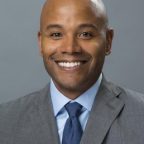This episode reprises many of the voices on our podcast from 2018 to emphasize the vibrance, diversity, resilience, and idealism of our democracy today. We are on the cusp of a moment of democratic renewal, and our podcast guests exemplify the bright future of reform in front of us. As Franklin Roosevelt advised in a prior moment of democratic renewal, our young citizens are writing the new chapters of democracy. Please listen and give them your support.
Voices featured in this episode:
Sophie Wysocki and Meena Anderson, Ep. 4 – Young citizens promoting democracy
Dr. Peniel Joseph, Ep. 6 – Race and Democracy in America Today
Augusta Dell’Omo and Chris Rose, Ep. 7 – Gender and Democracy
Sean Hassan, Ep. 9 – Religion and Democracy: How are we making our democracy more open and inclusive for different faiths?
Paul Stekler, Ep. 11 – The Media and Politics
Dr. Ruth Wasem, Ep. 12 – Congress and Democracy
Juliet Suarez and first time voter Jillian B. Smith, Ep. 13 – New and Future Voters: Why does this election matter so much?
Bryan Jones and Dr. James Henson, Ep. 14 – What did the 2018 elections mean?
Dr. Michael B. Stoff, Ep. 15 – The 100th Anniversary of the First World War
Guests
 Sophie WysockiSenior at the Liberal Arts and Science Academy in Austin, Texas
Sophie WysockiSenior at the Liberal Arts and Science Academy in Austin, Texas Meena AndersonJournalism Student at the University of Texas at Austin
Meena AndersonJournalism Student at the University of Texas at Austin Bryan JonesFounder and CEO of Strive and Solve Ventures and Chairman of Stand Up Republic
Bryan JonesFounder and CEO of Strive and Solve Ventures and Chairman of Stand Up Republic Peniel JosephJoint Professor at the LBJ School of Public Affairs and the History Department in the College of Liberal Arts at The University of Texas at Austin
Peniel JosephJoint Professor at the LBJ School of Public Affairs and the History Department in the College of Liberal Arts at The University of Texas at Austin Augusta Dell’OmoDoctoral Student in History at the University of Texas at Austin
Augusta Dell’OmoDoctoral Student in History at the University of Texas at Austin Christopher RoseDoctoral Candidate (ABD) in Middle Eastern History at the University of Texas at Austin and Adjunct Instructor in Global Studies at St. Edward's University
Christopher RoseDoctoral Candidate (ABD) in Middle Eastern History at the University of Texas at Austin and Adjunct Instructor in Global Studies at St. Edward's University Paul SteklerDocumentary Filmmaker and Wofford Denius Chair in Entertainment Studies at the University of Texas at Austin
Paul SteklerDocumentary Filmmaker and Wofford Denius Chair in Entertainment Studies at the University of Texas at Austin Jillian SmithGovernment, Middle Eastern Studies, and Arabic Student at the University of Texas at Austin
Jillian SmithGovernment, Middle Eastern Studies, and Arabic Student at the University of Texas at Austin Juliet SuarezFreshman IRG and sociology major in the Liberal Arts Honors program at UT
Juliet SuarezFreshman IRG and sociology major in the Liberal Arts Honors program at UT James HensonDirector of the Texas Politics project and Professor in the Department of Government at The University of Texas at Austin
James HensonDirector of the Texas Politics project and Professor in the Department of Government at The University of Texas at Austin
Hosts
 Jeremi SuriProfessor of History at the University of Texas at Austin
Jeremi SuriProfessor of History at the University of Texas at Austin
Intro Voice 1: This-
Intro Voice 2: … Is Democracy.
Intro Voice 3: A podcast that explores the interracial, intergenerational, and intersectional unheard voices living in the world’s-
Intro Voice 4: … most influential democracy.
Jeremi: Welcome to our new episode of This is Democracy. Today’s episode is a very special episode. This is our 20th episode of this podcast, which we began actually in the summer of 2018, and we thought we would take this moment at the holidays for our last 2018 episode before we get into 2019 and our 20th episode to reflect on what we’ve learned in this first period of what we hope will be a longstanding weekly podcast.
Jeremi: My partner in crime, Zachary Siri, is here with me, and Zachary, it was your idea to do this podcast. Why don’t you tell our listeners why we started this?
Zachary: Well, I was really … and I’ve always been interested in the audiovisual realm, and delving into these sort of nuances of the podcast world was really interesting, and when we started talking about the idea of a podcast, it was more of a way to express what ordinary people around us and what people we were interacting with thought about politics, but also what those voices of experts and others who were not often heard as much, what their views on politics were, and how we can play that with the way that our democracy is changing so rapidly today.
Jeremi: I think that’s great, Zachary, and one of the suggestions you made early one, and one of the reasons we have your poetry in every one of our episodes is because it provides a connection to the lives of citizens that we often don’t hear from, right? Is that important to you?
Zachary: Yeah. I think it’s really important to hear voices of those that we don’t often hear. I think also we try to bring it into a realm where we can showcase the way that our democracy is changing and has changed through a lens of different things, through the lens of different things that affect people’s everyday lives, and take those smaller instances like, I don’t know, seeing a homeless person on the street as in the case of our last episode, and showing how that fits into this larger story of democracy.
Jeremi: Absolutely. In many ways, our podcast is about the mosaic of democracy, and democracy is a mosaic, because it’s made up of many discordant voices. Voices that represent and speak for different experiences. Democracy is pluralism. It’s the mosaic that’s formed from these different voices coming together, not in unison, but in a cacophony that somehow finds a way to work together, that becomes rhythmic in its many different notes and many different sounds and many different perspectives.
Jeremi: That is why in episode one we opened with our inspiration from Franklin Roosevelt, which we return to today. In 1940, Franklin Roosevelt very famously said, and we actually had a recording of him saying this in episode one, that “we Americans today, all of us, we are characters in this living book of democracy, but we are also its author. It falls upon us now to say whether the chapters that are to come will tell a story of retreat or a story of continued advance.”
Jeremi: Our podcast has shown that our society, despite all the controversy and all the ugliness around us, especially at the national level, our society continues to advance. Each of our 20 episodes has idealistic exciting youthful voices discussing and proposing ways in which we can hit and address the challenges of our time and move in productive pathways forward.
Jeremi: It’s an idealism and an inspiration I think both Zachary and I have felt. Do you agree, Zachary?
Zachary: Yeah, I agree. I think we’ve really tried to center it around young people and the future of our society instead of just the sort of everyone who’s always heard or all the same people. We’ve tried to center it around those who will shape our future and change democracy and will be the characters in this living book of democracy.
Jeremi: That’s exactly right. So, the rest of this episode will not have my voice or Zachary’s, even though Zachary’s voice in so many ways captures the idealistic youthful aims of this podcast. The rest of today’s podcast episode is a sort of greatest hits compilation of the different voices we’ve heard through the prior 19 episodes addressing themes of belonging, themes of participation, voting, race, and most of all themes of reform.
Jeremi: Ways in which all of us, every day, can and will continue to work to make our democracy grow and thrive, and the ways in which all of us in our daily lives use history to improve on the world we live in today and to make for a better future. So, please listen to the next few minutes, the voices from our prior podcast episodes this season, and please contact us with ideas as we go forward into 2019. Our 2019 will be filled with even more idealism, even more youthfulness, and of course, more poetry from Zachary.
Jeremi: Any words from you, Zachary, before we go?
Zachary: Just have a happy holiday and a new year, and think about reform and the future of our democracy in this season of renewal as we start a new year.
Jeremi: Yes, and now to the voices of our podcast inspiring guests of the last few months. Thank you.
Mina Anderson: You kind of have to be political, and that’s what I do. Most of the conversations I have are very rarely like, wow, look at the grass. It’s so green outside. Starting those conversations can be kind of tricky, because I’m always like black lives matter, and then someone comes for me, and then I go for them, and it’s really a whole … it’s a whole …
Jeremi: Mm-hmm (affirmative). How has your perspective on this changed in the last year or so?
Mina Anderson: I moved to Austin four years ago. I started high school here from London, England, and literally the day after I arrived at Austin Airport, Michael Brown got shot in Ferguson. So, I sort of went from like, yeah, free healthcare and only mild racism to, we shoot black people in the streets, and I was sort of just immediately thrust into this world of … I came here as the rise of the Black Lives Matter movement was beginning.
Mina Anderson: I just didn’t know what was going on. The culture shock, I feel like, was so much more intense just because of that event and sort of the protests and riots that followed.
Peniel: I think the BLM movement is a social movement, a very important social movement, and they’re really practicing what the legal scholar, Kimberly Crenshaw, calls “intersectionality.” That’s really a big word to talk about identity in a nuanced way. It’s really how we live our lives. It’s race, place, geography, sexuality, class, ethnicity, and all these things impact us in different ways.
Peniel: What Black Lives Matter does is two things. It makes an argument that the criminal justice system represents a gateway to multiple systems of oppression in the United States. So, criminal justice system, whether we’re talking about high bail, whether we’re talking about disparate sentencing for black and white criminals, whether we’re talking about the fees that prisoners have to pay-
Jeremi: Right, right.
Peniel: … even after they are incarcerated.
Jeremi: For soap.
Peniel: For soap, for different things. Whether we’re talking about no access to housing, and no access to food stamps, or check the box if you have a felony conviction. They’re saying it’s a gateway to multiple systems of oppression that are connected to public schools. They’re connected to what we used to call housing projects.
Jeremi: Yep.
Peniel: They’re connected to residential segregation. So, that’s one argument. The second is that when we think about social justice in the United States, we have to think about the most marginalized communities. We can’t just say that we’re trying to liberate or free black straight males.
Jeremi: Right, right.
Peniel: Or the usual cast of characters. We have to think about who are the most marginal people in our society, and from that perspective, they’re looking at LGBTQ communities. They’re looking at communities that are HIV positive. They’re looking at communities that live in environmentally toxic areas.
Peniel: What’s interesting about the black community and Latino community is that they are more likely to live in environmentally toxic neighborhoods.
Jeremi: Right.
Peniel: Black and Latino children have higher rates of asthma, for instance, and not exercise induced asthma, because you’re living in areas that are unclean and unsafe, unlike Hyde Park and Rosedale.
Jeremi: Right.
Peniel: Right. In Austin, Texas, right? Austin’s a place where, if you’re white, your kids probably aren’t going to school with black kids, right?
Jeremi: Right.
Peniel: So, those are all these different ways that racial segregation, Jim Crow, racism still exist and thrive.
Mina Anderson: So, then I came to LASA halfway through my high school career. I came as a junior. So, I went from a relatively diverse high school to one, as Sophie said, that is primarily white and Asian. I was one of 25 black people, I think. I mean, I’m mixed. So, that’s a whole other identity crisis that I’m not going to get into, but I mean, the past year I think being at LASA definitely …
Mina Anderson: I’m not sure if it prejudiced me. It’s difficult, because again, being mixed I’d have a pretty deep connection with both white and black people, but I simultaneously walk this line of fitting in with neither group.
Jeremi: Right.
Mina Anderson: And here at UT, I’ve been trying to find some kind of community where I can be both white and black, and where I can be mixed and be myself.
Peniel: Well, I’d say one of the lessons I’ve learned is to speak your truth, right? When you think about students, you’re always wanting them to use fact, to use data, to use what they’ve read, but also they have to use their personal experience. All of us have a personal experience, and part of that leads us to our story, because everything we’re doing in class is about a story.
Peniel: We’re narrating a story of our lives, of our existence, of American history, of American politics. How did we get to this point today? So, students of color and students coming from backgrounds that are non-majority backgrounds, they have to speak their truth and have these courageous conversations, and give people an alternative view, because some of the times when you’re the only person in the room, your point of view is the one that’s most sorely needed.
Jeremi: Of course.
Peniel: We know this. I mean, teaching at the LBJ School, teaching in the history department, these are places that are not going to be as diverse as we might like. So, our perspective of saying, hey, let’s look at this another way when we think about the curriculum, when we think about students, when we think about campus climate. We have real things to say that a lot of times our colleagues are just unaware of.
Jeremi: Right.
Augusta: I think one of the most isolating aspects of our sort of male dominated society is how much it makes women feel alone. I wasn’t alive at that time, I remember seeing the picture when I was thinking back about this period of Anita Hill alone in front of all of those white men.
Jeremi: Right.
Augusta: And she wasn’t alone. She had tons of black women supporting her, but in that moment, she was alone sitting there.
Jeremi: Sure.
Augusta: That’s a very resonant image for me, because most women can relate to being the only one in the room and having to defend yourself, and you have to have that support system, because otherwise it’s just so hard. I think I had this idea before coming into graduate school because of how our male dominated society makes women feel, that I could only be the only person at the table.
Augusta: I think it really took coming to graduate school and seeing wonderful charitable women who were in the field already, making space for me at that table, and bringing me in, and I think that’s where I see my challenge going forward is continuing to create those spaces for women that come after me, particularly non-white women, and making sure that I’m not just the only one at the table.
Jeremi: Right.
Augusta: That there’s more people, that we’re constantly pushing the discussion, and that it’s more than just oh look here’s one person here, that it’s a real tangible commitment to acknowledging the brilliant work of women who are already in this field and who have done such great things for this field before even I showed up.
Christopher Rose: So, as I mentioned, I teach at Catholic school. It is a liberal Catholic school. They, like UT, Saint Edward’s has sexual orientation as a protected category of person in its employment contract and its harassment suits, which is something that we have to do as institutions, because under the state of Texas, that is not a protected class. You can be fired for being gay in this state, but it’s also something that I don’t want to make an issue of inadvertently-
Jeremi: Right.
Christopher Rose: … in class.
Jeremi: Right.
Christopher Rose: So, I’m very careful about what I share about myself, but I also do that, I think, because there’s something about the professor student relationship where they don’t need to have all the information about my private life.
Jeremi: Right.
Christopher Rose: But it’s also made me, in my scholarship, very aware of looking at people whose stories are not normally told. My dissertation project actually is I’m looking at the peasant classes. I’m using medicine as a way to try to get there, because these are people who didn’t leave records. I’m working on Egypt during the first World War, but you know, I’m really interested in trying to get more of a diversity-
Jeremi: Right.
Christopher Rose: … of experience.
Jeremi: Right, to bring other voices in.
Christopher Rose: Right. You know, I’m aware of the fact that women are not represented here. I’m aware of the fact that religious minorities are not represented here. I’m looking for things that go a little bit against the grain. Now, I’m fortunate right now that that’s a trend in scholarship, generally. This is the new thing, although Middle Eastern studies as a field is a little behind everybody else in adopting these things.
Christopher Rose: We still, for example, do not really take scholars who are from the region and publishing in the region seriously, which is not the case with, for example, European studies or South Asian studies or Latin American studies. So, we ourselves as a field still have a ways to go in that regard, but I would say that I have developed more of an interest in non-traditional stories.
Christopher Rose: My sense is under the current climate, I think we all know what life is like for many individuals who are practicing Muslims or who are culturally Muslim, from Muslim countries. I mean, I don’t need to belabor that point.
Jeremi: Right.
Christopher Rose: Jeremy, I think it’s an opportunity for us to educate others. I think even folks who are allies and friends and otherwise very supportive by and large probably have a pretty limited understanding of the diversity within Islam, the history of Muslim contributions to civilization, and some of that is because, rightfully so perhaps, as a country, we’ve created hopefully a very healthy separation between church and state, but I think perhaps a little bit of the slip that’s happened in that is that we don’t educate about religion.
Jeremi: Right.
Christopher Rose: So, it’s an opportunity, perhaps informally at this stage, or through formal mechanisms that we create, to educate others about Islam, about Muslim history, about Muslim contemporary society. In the long run, look at what our educational system can do to contribute to understanding about one another, including about one another’s religious background.
Paul: The problem for a filmmaker right now is exactly what do you put out there that allows people to think for themselves? It’s hard calculation. Also, you need to be able to raise funds. You need to be able to get people interested. There’s a reason, I think, that some people … I mean, yesterday I was talking about Tucker Carlson.
Paul: I knew Tucker a little bit years ago. He’s a great guy. What happened? This is a conversation I had, and this may be going to a different direction.
Jeremi: Well, what happened? What happened?
Paul: Well, I think what happened was cable news. I think yesterday literally I was having a conversation with a friend of mine who has been very successfully involved in Republican national politics, talking about we thought that Fox News has been the worst thing to happen to American politics in generations. It’s just horrible.
Paul: I’m sorry to sound partisan about this, but I watch Fox at night, and I go, what universe are we listening to?
Jeremi: Right, right.
Paul: I mean, I’ll give you an example, and this was like a few years ago, and stop me if this is going off message. Back in 2008, I helped produced Frontline’s big documentary about the 2008 election, McCain and Obama.
Jeremi: Sure.
Paul: I thought we did a really good job. It was pretty balanced. It was very balanced, and we went out of our way to make sure that it was. They were both interesting guys.
Jeremi: Absolutely.
Paul: Interesting interplay. Fox News had their big historical film on one night. I was curious to see how they would differ with us just in their approach. There was another two hour film, I believe, and they spent a large amount of their time tracing two Indonesian students who might have known Obama going back to Indonesia, because they might have had ties to terrorists. I’m watching this going, what universe is this in?
Jeremi: Right, right.
Paul: I mean, it’s … you know. So, the Tucker Carlson with the bow tie who used to be on Crossfire with Paul Begala.
Jeremi: Mm-hmm (affirmative).
Paul: He’s not the Tucker Carlson there is today. Why is he doing this? The ratings are high.
Jeremi: Mm-hmm (affirmative).
Paul: You throw the red meat out there, but what does this lead to in terms of the amount of anger and rage in the population, especially if that’s all you’re watching?
Jeremi: Right.
Paul: Again, I’m not a big fan of MSNBC and CNN. I can’t think of a single person I actually want to watch there, but it’s mostly a personality thing as opposed to an ideological thing.
Jeremi: Right. Right.
Paul: I don’t know, Jeremy. It’s kind of like it’s … I find it incredibly depressing.
Juliet: My friends, or my peers, I guess, sometimes don’t stop to think that there are some people who can’t vote despite wanting to, and I think … My roommate, for example, she considers herself to be apolitical, and I’m not sure that she was planning to vote at all in the election. One day I was really, really frustrated, and I came home, and I started ranting to her about this, because something in my class sort of reminded me of the fact that I can’t vote, and she was like oh, wow. Okay. I’m going to make sure I vote for you.
Juliet: So, that felt really good. Just my lack of voting, I guess, can encourage other people to. I guess that’s something.
Jeremi: Jillian, you voted for the first time, yes?
Jillian: Yes, sir.
Jeremi: What did that feel like?
Jillian: It felt really amazing. My junior and senior year in the presidential election and then in local elections in my home town, I felt like I was doing everything I could but vote.
Jeremi: That was in high school, right?
Jillian: Yes. I felt like I was doing everything I could but vote, for my voice to be heard, and I would still be at places with all the signs and people talking about why you should vote for certain candidates, and people would ask me if I was with my mom when I was with my mentor on City Council. So, it was just this constant demeaning process of my voice never being to be heard whenever I was doing everything I could for it to be heard.
Jillian: So, it was really nice walking into the FAC on campus and being third in line knowing that I wasn’t going to be asked if I was with my mom. I wasn’t going to be asked if I had to go to school, because I had the right to vote, and I was getting to exercise it for the first time.
Jeremi: Wow. You felt like a citizen, right?
Jillian: Mm-hmm (affirmative). I felt like a respected citizen who had a valued opinion on how our country should be run.
Sophie Wysocki: In my high school career, I’ve participated in a lot of different marches and things like that, one of which was in Washington, DC. One was here. Those have been like life changing moments for me. It is scary to think that if I go and something bad happens, what am I going to do, you know?
Jeremi: Right, right, right.
Sophie Wysocki: What if someone shows up with a gun?
Jeremi: Mm-hmm (affirmative).
Sophie Wysocki: Or like the police show up and there’s something bad that happens.
Jeremi: So, why do you go if you’re concerned about that?
Sophie Wysocki: I think that showing up for people that I care about and for issues that I care about is the most important thing that I could ever do, and that is the thing that pushes me to do it every single time, because if people don’t feel like they can be safe, then how is American really free?
Jeremi: Right. Right.
Sophie Wysocki: And the March for Our Lives. That affects me every single day. I go to school. We have lockdown drills relatively often. Last year, we had a lot of lock downs, and a lot of gun scares, and gun violence is something that terrifies me. Pretty much every day I think about what if something happens? It could be me.
Jeremi: Right, right, and you’re so vulnerable at a school.
Sophie Wysocki: Mm-hmm (affirmative).
Jeremi: Right.
Sophie Wysocki: So, I think that because I care so much about each of these issues, that they affect me so personally and affect people I care about so personally, that I need to show up regardless of potential danger.
Jeremi: Right.
Sophie Wysocki: Because that’s, I guess, my civic duty.
Paul: You know today, I mean, I know this is a cliché, Jeremy, but the entire society’s become much more niche.
Jeremi: Right.
Paul: I’m living in one universe, and somebody else lives in another universe, and it becomes increasingly hard to even talk about it, let alone be able to have some sort of a dialogue. I think that the idea that it’s hard to be able to have an issue that has one side where there’s a consensus, it becomes increasingly hard if not impossible in a world where everything is divided. Where if I say something that I’m a Democrat and you’re a Republican, you just naturally go the exact opposite side.
Paul: Our political system was based, to a certain extent, on compromise, or some sort of compromises.
Jeremi: Right.
Paul: Now, if you’re a compromise candidate, you’re seen as a total sellout.
Jeremi: Right.
Paul: On both sides. I don’t know where that leads to in terms of actually coherent public policy.
Jeremi: Ruth, why do so many Americans feel that Congress doesn’t represent them?
Ruth: Austin, Texas is a classic example of a community that has a definite identity, and in fact many communities within it that have identity, and yet it has been hack sawed into a variety of different congressional districts so that the people of Austin do not have a voice in any congressional district. Generally, they were carved up to maximize incumbency.
Jeremi: What’s the one thing you’d like to see Congress do to make itself more effective going forward, and to make itself more representative, or at least make people feel they’re more represented in Congress?
Ruth: I think getting rid of the Hastert Rule.
Jeremi: Okay. Explain.
Ruth: That was something that the Republicans put in place that they would not bring a bill to the floor if it didn’t have a majority of support in their own caucus. So, a majority of Republicans had to support something before any bill could come to the floor.
Jeremi: This is why gun control has never come to the floor, right?
Ruth: A lot of things have never … and this was kind of what did in Speaker John Boehner.
Jeremi: Right.
Ruth: Because sometimes to govern, particularly on appropriations and budgets and military and foreign affairs things, you govern from the middle.
Jeremi: Right.
Ruth: And the Hastert Rule prevented governing from the middle. One the freedom caucus was large enough, and that’s a conservative group of Congress. It kind of morphed out of the Tea Party. They effectively had a veto over anything that could come to the floor. So, Congress did not represent, in its own functionings, the majority of its own members, because there were many times when moderate Republicans and moderate Democrats agreed on something that the conservative Republicans and the liberal Democrats wouldn’t have, but we could have gotten a lot of things done without that, and it would have represented the majority. So, you’re letting minority rule.
Jeremi: Correct. That’s a case where clearly a new crop of members of Congress could change things. Change things very quickly. Most people don’t realize the rules Congress operates are the rules Congress makes.
Ruth: Mm-hmm (affirmative). At the beginning of every Congress.
Michael: I think we ought to take our veterans very seriously. I mentioned this before. We ought to listen to them. We ought to care for them. I think, too, we ought to vote for them.
Jeremi: Yes.
Michael: And the reason I say that is because veterans are used to working with a wide variety of people for a common goal. They don’t break down into tribes. The Army is designed to bring people together, and I’m very hopeful, for example, that we have a number of veterans running and elected-
Jeremi: Yes.
Michael: … to office that we will get less narrow partisanship and more cooperation, more compromise, which has, as you know, is at the core of effective politics. So, I think that we should take care and be properly skeptical and concerned about the rise of nationalism as we’ve said many times. We ought to listen to our vets, and we ought to educate a younger generation about the horrors of war.
Jeremi: What a lot of students ask me, Jim, is how they can make sense of what looked like two contradictory phenomena, right? On the one hand, there’s this positive story, right, of new kinds of people who represent different communities, Latina, African American, women. More than 100 women in Congress now.
Jeremi: On the other hand, there’s so much more evidence of racism. It’s hard to look at the Florida race without thinking that in the end, the fact that Andrew Gillam was African American cost him, even though he was ahead in the polls, right? To look at the race in Georgia, and then those who won in Texas as well.
Jeremi: So, how do we make sense of this? How are we becoming more racist and less racist at the same time?
Jim: Well, I think we have to remember that there’s the underlying structure, and then there’s what’s revealed, and what we see in front of us. The essence of what we’re seeing, frankly, in the White House right now, in the movement that has gathered and is most enthusiastic about Donald Trump, is a very reactive movement, and it’s been pent up, and it’s reactive against much of the progress that we’ve made in the country in the last 50 or 60 years.
Jeremi: Right.
Jim: I think that I’m very influenced and kind of persuaded by the political philosopher Cory Robin’s understanding of what is most continuous about the heart of the most conservative of our politics, and there is a reaction against political change and the challenge to hierarchies.
Jeremi: Right. Right.
Jim: And I think we’re in the middle of a push back that was given voice and energized, but not started by the current president.
Jeremi: Right.
Jim: I think the president, this is one of those areas where as much as Donald Trump in the White House is an active agent now that he’s there. This is an area in which Donald Trump was not the cause of anything. He was the effect.
Jeremi: Right.
Jim: And so I think that’s when students ask me about that, that’s what I say is that these are things that were unresolved issues, and it’s an ongoing process to … whatever figure of speech you want to use, whether it’s the perfectibility of the Constitution or the way that liberalism develops over time.
Jeremi: Right, it’s protean character.
Jim: Yes. Exactly. Choose your metaphor, right? Choose your figure of speech. That’s where those contradictions come from. Those things that seem like contradictions, those tensions are what propel us.
Jeremi: Right, and I also don’t think that the … I think the percentage of people that fall into that racist camp is actually relatively small. The problem that we have right now is that they have been empowered to become vocal.
Jim: Right.
Jeremi: And they are taking advantage of that, and I think Gillam had a great line where I’m not saying that you’re racist. I’m saying the racists believe that you are.
Jim: Right.
Jeremi: And I think that that was a spot on line, because you see people like David Duke all of a sudden coming back out from the rock that they live under and making comments and endorsing policies and encouraging their base, albeit small, to step up and become vocal and loud and cause issues. I think that that does skew a lot of things, because I don’t think that …
Jeremi: I do think that there are big macro changes beyond racism that are causing the Republican party to try to figure out what its identity is, but I think the concern many have, right, is that our political structure has disproportionately empowered that. So, that’s really the question I wanted us to close on, because I think it’s the big question, right?
Jeremi: Did the results in this election give us reason to believe that our political structure is adjusting to empower other voices rather than these minority voices that have seemed to hijack our politics for the last few years, or should we expect ourselves to be still stuck in this space?
Jim: Yes. Yeah, you know, look, I’m on a small email list with a group of aging white liberals who have played poker together for 20 years, and one of the more dour among us Wednesday morning was really down. He was just saying-
Jeremi: Really?
Jim: … I see that there’s been some change, but I still feel like I’m poised over the abyss.
Jeremi: Right, yeah.
Jim: What I basically said was you are still poised over the abyss, but yesterday we gained a guard rail.
Jeremi: Yes.
Jim: It’s a little less likely that you’re either going to be tempted to just leap, or that you’re going to accidentally fall. That’s the way to kind of think about these results. So, I think institutions, you’re a historian, tend to adjust more often than not slowly with a lag.
Jeremi: Absolutely.
Jim: I think I would be much more worried had things shifted in such a way or our projections had been so off that somehow the Democrats didn’t take hold of the Congress, or of the House of Representatives. I say that not because I think the Democrats are going to save democracy, but because I think that institutional foothold is really critical at this time.
Jeremi: Absolutely.
Jim: I don’t expect it to be miraculous, but I do expect it to blunt some of the more negative things that we’ve been talking about.
Jeremi: Right. Yeah, there’s a wonderful quote. I should remember this. It’s hanging over my desk where it says that people tell just two or three stories, but they tell them over and over and over again.
Jim: Right.
Jeremi: And they always differ because of the internal passion and the characters that they bring with it. We’re not all that different. We’re born. We live. We die. Every life is interesting. Every life has a narrative. There’s always a mystery. There isn’t a mystery to where it eventually ends up, but there is a mystery in terms of how that life gets led. Which choices do you make?
Closing Voice: This podcast is produced by the Liberal Arts Development Studio and the College of Liberal Arts at the University of Texas at Austin. The music in this episode was written and recorded by Harrison Lemke, and you can find his music at harrisonlemke.com.
Closing Voice 2: Subscribe and stay tuned for a new episode every Thursday featuring new perspectives on democracy.